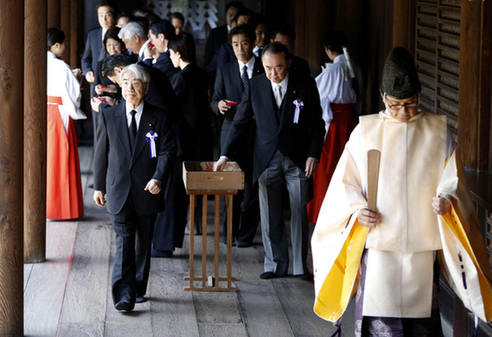Lessons from WWII
 |
|
A group of Japanese lawmakers visit the notorious Yasukuni Shrine on August 15, 2014. |
History Is a Mirror
It has been 75 years since WWII erupted, but memories of it remain in the minds of people around the world. The many books, films and TV dramas about the war are constant reminders of that dark period of history. Over the past 50 years more than 43,000 books on WWII were published in the U.S. alone.
Professor Robert Jeffrey Moore of the University of Sheffield said, “WWII is still fresh in the minds of people in the U.K. and is constantly the subject of publications, TV programs and films.” He nonetheless believes that this effect is not one solely engineered by the state or media, but also attributable to emotions evoked by reflections on the sacrifices of men and women that served in the armed forces and the conflicts in which they fought during WWII.
After WWII, Germany and Japan adopted contrasting approaches to it. As Prof. Li Lezeng of Tongji University said, Germany’s transition to a modern political system is accredited to the heavy-handed measures that the Western allies took to eradicate the root causes of war in Europe, and their inclusive policy of bringing Germany into their alliance under the background of the Cold War. “Though the development of Germany’s political culture did not keep pace with the progress of its political system, it is distinctive by virtue of an in-depth understanding of Nazi rule and of self-examination with regards to its role in WWII,” Li said. “This affirmative factor in Germany’s political culture provides an important non-institutional guarantee of the country’s contribution to world peace and security and prevention of wars.”
Nakayama Toshio has observed the dangerous trend of the Japanese government, at U.S. connivance, in constantly attempting to revise the constitution and build up its military, despite anti-war sentiments among its people.
Reflections on WWII by the governments and the general public of countries that were involved in it have never ceased. Since the year 2002, representatives of researchers, teachers and civil organizations in China, Japan and South Korea have convened annually a forum on history and peace in East Asia, according to Bu Ping, former head of the Institute of Modern History, CASS. After discussions, the forum set up a joint history compilation committee. It oversaw the publication in 2005 of A History that Faces the Future – the Modern History of Three Asian Countries, an auxiliary middle school textbook in China, Japan and South Korea. History study summer camps for students from these three countries are also organized every year. From 2006 to 2012, scholars from all three countries collaborated on another book, A Modern History of East Asia Beyond the Boundaries. It features a perspective on the region, rather than on specific countries.
“For many young people the war is in the hoary past, or something that exists only in the virtual world of their computers. This hollow, abstract conception of the war is prey to influences by sentiment-laced information. It can be easily misled in extremist or parochial directions,” Bu Ping warned. He called on scholars to guide the younger generation in developing a deep and full understanding of the war, broaden their vision through history education, and contemplate the past and future of East Asia from a broader perspective.
“History is a mirror. Restoring the truth of history and distinguishing right from wrong is an imperative political mission. To defend history is to defend peace,” Party secretary of the Institute of Japanese Studies, CASS, Gao Hong said.
